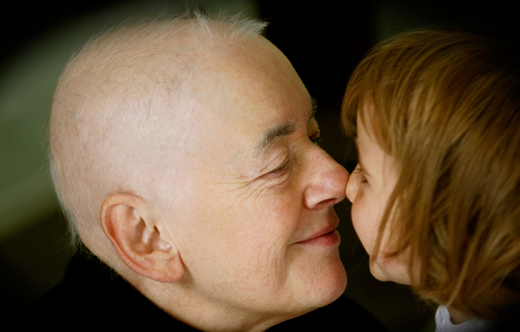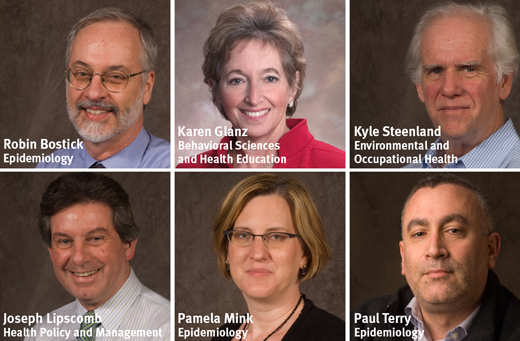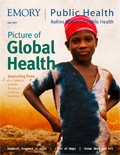Advancing cancer research in Georgia

RSPH scientists are helping drive cancer research in Georgia to advance prevention and outcomes for patients, families, and communities throughout the state.
By Pam Auchmutey
Every success story begins with an idea. Ten years ago, the late Hamilton Jordan, former White House chief of staff and a six-time cancer survivor, met up with Michael Johns, then head of Emory's Woodruff Health Sciences Center, at a social gathering. Before parting, they talked about controlling cancer in Georgia. It was more than a casual conversation.
Jordan and Johns did their homework and convinced then Governor Roy Barnes to ramp up Georgia’s efforts in cancer research, prevention, early detection, and treatment. The result was the Georgia Cancer Coalition (GCC), incorporated in 2001 with a business plan that called for funding of $400 million in tobacco settlement funds over 10 years.
|
Focus on cancer |
The GCC quickly evolved into a national model for bringing cancer experts together at the state level. It also became a legacy for Jordan, who died of cancer in 2008.
"Hamilton credited his survival in part to his ability to be involved in clinical trials and to have access to quality care providers," says GCC president and CEO Bill Todd (who also serves on the RSPH Dean’s Council). "He wanted all citizens of Georgia to have those same opportunities."
Today, the coalition unites physicians, hospitals, government agencies, public health services, community health and survivor groups, universities, industries, and nonprofits around a common goal: reducing cancer-related deaths in Georgia.
Like Jordan and Johns, RSPH researchers are committed to preventing the disease in a number of ways—encouraging children to use sunscreen at neighborhood swimming pools, speeding up reporting of essential cancer data, developing biomarkers to detect colorectal cancer risk earlier, reducing obesity and other primary risk factors in rural Southwest Georgia, understanding how hormone replacement therapy affects cancer, and more.
Scientists like these drive cancer research across Georgia. Through the GCC Distinguished Cancer Clinicians and Scientists program, the coalition is building a sizable force to boost cancer research statewide. As of 2008, the GCC had recruited 118 scholars and leveraged more than $200 million for research from federal and private sources.
To date, 50 of the GCC Distinguished Cancer Scholars are at Emory and include six in the RSPH: Robin Bostick, Pamela Mink, and Paul Terry in epidemiology; Karen Glanz in behavioral sciences and health education; Joseph Lipscomb in health policy and management; and Kyle Steenland in environmental and occupational health.
|
|
||||
Their work advances research at Rollins and the Emory Winship Cancer Institute. Winship’s Cancer Control and Population Sciences core, led by Bostick, is based in the school. RSPH Dean James Curran is among the Emory leaders who advise Winship.
In April, Winship became the first National Cancer Institute (NCI) Cancer Center in Georgia and one of 65 nationwide. The NCI designation, earned with the help of health sciences researchers across Emory, will provide an additional $4.3 million over the next three years in federal research support.
"Cancer strikes more than 35,000 Georgians each year, and through initiatives like the Georgia Cancer Coalition and the Georgia Research Alliance, we are working hard to eliminate this disease," says Governor Sonny Perdue of the NCI designation. "Winship serves as a model in establishing collaborative research programs and in working statewide to address the pressing issues related to treatment, education and access to care for cancer patients."
The relationship with Winship is "a good one," notes GCC Distinguished Cancer Scholar Joseph Lipscomb. "If you go to any NCI cancer center in the country, there are three basic components: bench science, clinical trials, and population sciences. We contribute directly because our studies are reaching out to Southwest Georgia and elsewhere in the state. It’s public health faculty who provide that expertise in outreach and health disparities. The RSPH creates the fabric for recruiting and retaining faculty and supporting research that benefits Rollins and Winship."
The GCC Distinguished Cancer Scholars program, he adds, helps RSPH faculty grow knowledge long term. "It’s an investment that allows us to shape our own work and cancer research at Emory more effectively." —Pam Auchmutey
The Georgia Cancer Coalition: At a Glance 2008118 GCC Distinguished Cancer Clinicians and scientists in Georgia 50 GCC clinicians and scientists at Emory 6 GCC scientists in the Rollins School of Public Health The Southwest Georgia Cancer Coalition, which partners with the RSPH, is among the GCC’s six regional cancer coalitions. |
||||



